For the 2025 school year, there are 2 public middle schools serving 127 students in Quincy School District. This district's average middle testing ranking is 4/10, which is in the bottom 50% of public middle schools in Washington.
Public Middle Schools in Quincy School District have an average math proficiency score of 26% (versus the Washington public middle school average of 36%), and reading proficiency score of 42% (versus the 51% statewide average).
Minority enrollment is 79% of the student body (majority Hispanic), which is more than the Washington public middle school average of 50% (majority Hispanic).
Overview
This School District
This State (WA)
# Schools
8 Schools
800 Schools
# Students
2,452 Students
302,560 Students
# Teachers
155 Teachers
16,189 Teachers
Student : Teacher Ratio
16:1
16:1
District Rank
Quincy School District, which is ranked within the bottom 50% of all 306 school districts in Washington (based off of combined math and reading proficiency testing data) for the 2021-2022 school year.
The school district's graduation rate of 87% has increased from 74% over five school years.
Overall District Rank
#274 out of 307 school districts
(Bottom 50%)
(Bottom 50%)
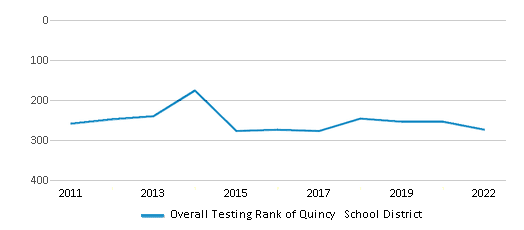
Math Test Scores (% Proficient)
20%
40%
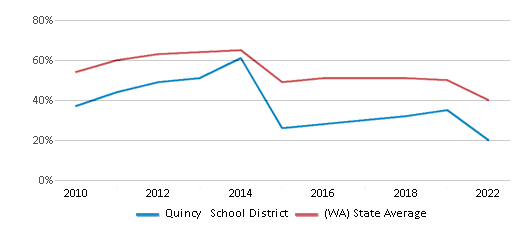
Reading/Language Arts Test Scores (% Proficient)
32%
53%
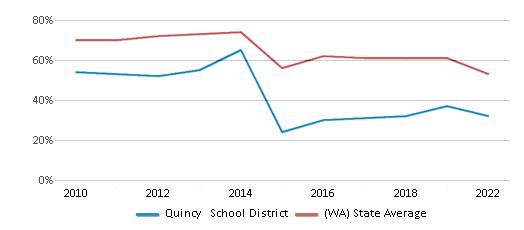
Science Test Scores (% Proficient)
23%
49%
Graduation Rate
87%
84%
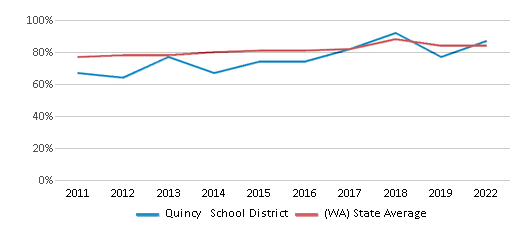
Students by Ethnicity:
Diversity Score
0.23
0.68
# American Indian Students
2 Students
5,703 Students
% American Indian Students
n/a
2%
# Asian Students
12 Students
23,666 Students
% Asian Students
1%
8%
# Hispanic Students
2,141 Students
73,370 Students
% Hispanic Students
87%
25%
# Black Students
4 Students
13,426 Students
% Black Students
n/a
5%
# White Students
280 Students
148,736 Students
% White Students
12%
50%
# Hawaiian Students
3 Students
3,970 Students
% Hawaiian Students
n/a
1%
# Two or more races Students
10 Students
26,275 Students
% of Two or more races Students
n/a
9%
Students by Grade:
# Students in PK Grade:
21
1,563
# Students in K Grade:
293
3,945
# Students in 1st Grade:
218
4,184
# Students in 2nd Grade:
216
4,295
# Students in 3rd Grade:
232
4,473
# Students in 4th Grade:
220
4,820
# Students in 5th Grade:
229
7,072
# Students in 6th Grade:
9
71,936
# Students in 7th Grade:
14
81,343
# Students in 8th Grade:
14
82,029
# Students in 9th Grade:
241
11,117
# Students in 10th Grade:
267
8,145
# Students in 11th Grade:
230
8,299
# Students in 12th Grade:
248
9,339
# Ungraded Students:
-
-
District Revenue and Spending
The revenue/student of $23,146 is higher than the state median of $18,796. The school district revenue/student has grown by 24% over four school years.
The school district's spending/student of $22,064 is higher than the state median of $19,246. The school district spending/student has grown by 24% over four school years.
Total Revenue
$57 MM
$20,715 MM
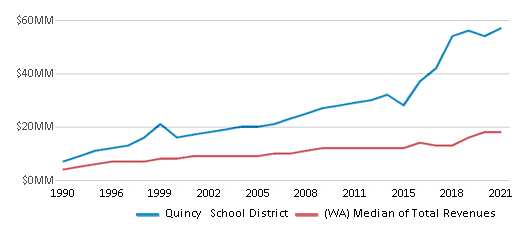
Spending
$54 MM
$21,212 MM
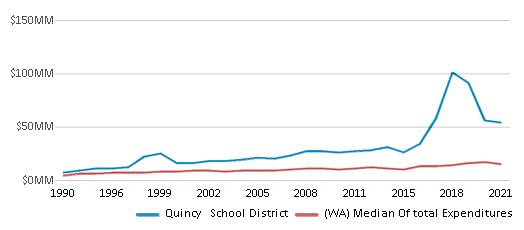
Revenue / Student
$23,146
$18,796
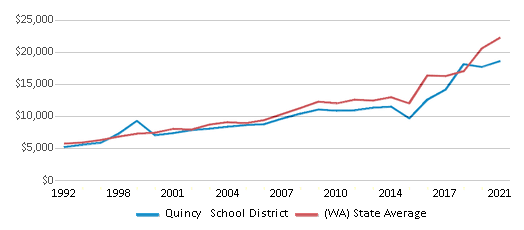
Spending / Student
$22,064
$19,246
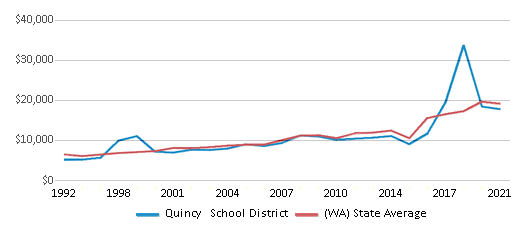
Best Quincy School District Public Middle Schools (2025)
School
(Math and Reading Proficiency)
(Math and Reading Proficiency)
Location
Grades
Students
Rank: #11.
Quincy Innovation Academy
Alternative School
(Math: 21-39% | Reading: 40-59%)
Rank:
Rank:
4/
Bottom 50%10
404 1st Ave Sw
Quincy, WA 98848
(509) 787-1678
Quincy, WA 98848
(509) 787-1678
Grades: K-12
| 103 students
Rank: #22.
Quincy Innovation Academy Big Picture
(Math: ≤20% | Reading: 21-39%)
Rank:
Rank:
1/
Bottom 50%10
404 1st Ave Sw
Quincy, WA 98848
(509) 787-1678
Quincy, WA 98848
(509) 787-1678
Grades: K-12
| 24 students
Recent Articles

Year-Round Or Traditional Schedule?
Which is more appropriate for your child? A year-round attendance schedule or traditional schedule? We look at the pros and cons.

Why You Should Encourage Your Child to Join a Sports Team
Participating in team sports has a great many benefits for children, there is no doubt. In this article you will learn what those benefits are.

White Students are Now the Minority in U.S. Public Schools
Increasing birth rates among immigrant families from Asia and Central and South America, combined with lower birth rates among white families, means that for the first time in history, public school students in the United States are majority-minority. This shift in demographics poses difficulties for schools as they work to accommodate children of varying language abilities and socio-economic backgrounds.





